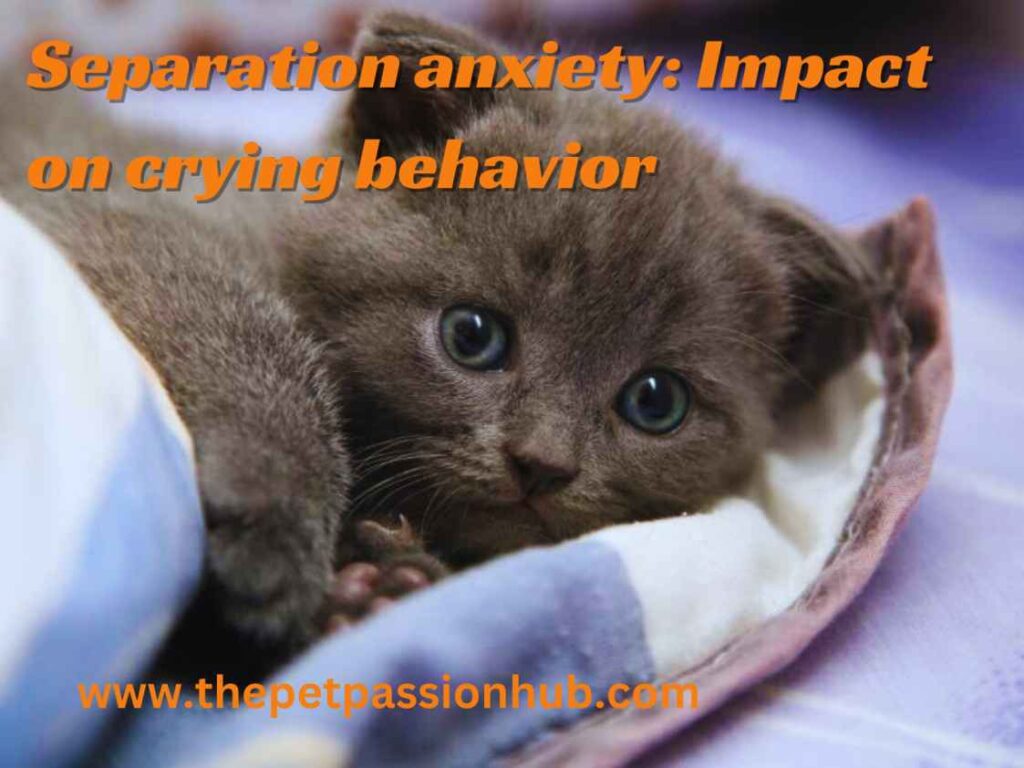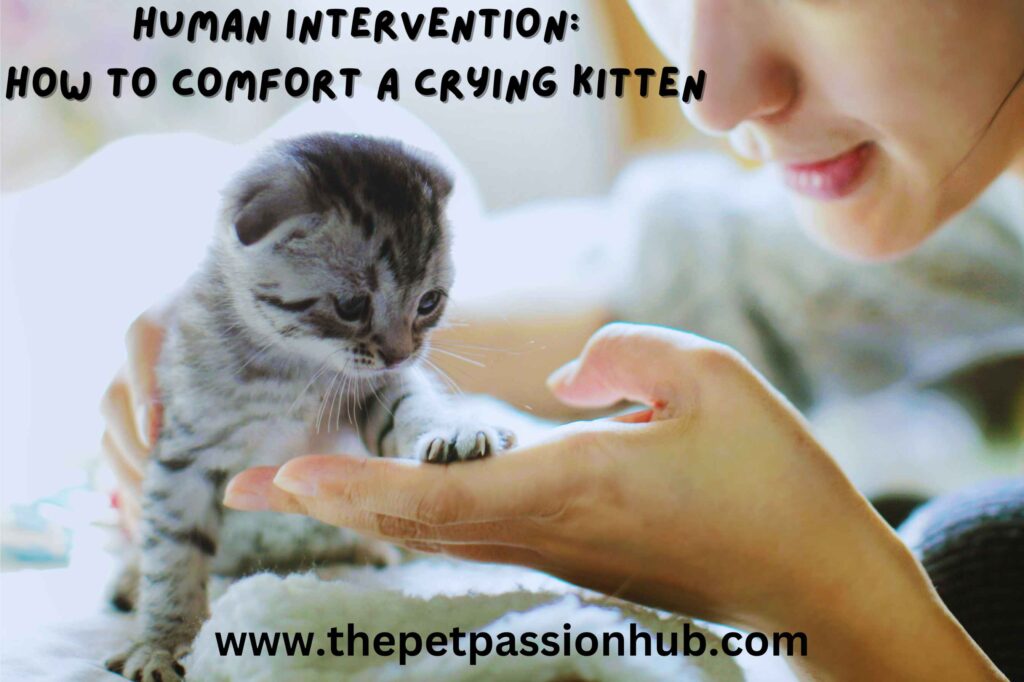Introduction
Have you ever woken up in the middle of the night by the heart-wrenching sound of a kitten crying for its mother?
It’s a sound that tugs at our heartstrings and leaves us feeling helpless. Wondering just how long this little ball of fur will continue to call out for comfort.
As nature lovers and pet owners, we often find ourselves intrigued by the behavior of these tiny creatures. Especially when they are in distress.
In this article, we will delve into the truth about how long kittens cry for their mom. Uncovering the reasons behind their persistent meows and exploring what it means for both kittens and their human companions.
So, if you’ve ever found yourself pondering over this feline mystery or have been curious about your own kitten’s vocalizations. Stay tuned as we unravel the secrets behind those plaintive cries for mama cat.
Understanding the kitten-mother bond
The kitten-mother bond is a deeply complex and emotionally rich relationship. That shapes the psychological and social development of young felines.
Feline separation anxiety can manifest in kittens who are prematurely separate from their mothers. Impacting their ability to form secure attachments and cope with stress later in life.
This highlights the importance of understanding and respecting the natural maternal instincts of mother cats. As they play a crucial role in shaping the emotional resilience of their offspring.
It’s fascinating to observe how cat maternal instincts guide the nurturing behavior of mother cats. Who instinctively provide warmth, protection, and nourishment to their kittens.
These early interactions not only ensure the physical well-being of the kittens but also contribute to their emotional security.
Understanding this unique bond sheds light on the truth how long do kittens cry for their mom when separate. Highlighting the profound impact that a strong maternal bond has on these young animals’ well-being.
Kitten development: Stages of vocalization
As kittens grow and develop, their vocalizations go through several stages. That provide insight into their communication with their mother and the world around them.
During the first few weeks of life, kittens primarily use high-pitched mews. And cries to communicate with their mother, signaling hunger, discomfort, or simply a need for warmth and reassurance.
As they reach 3-4 weeks of age, their vocal repertoire expands to include chirps, trills, and purring. As they start to explore their surroundings and interact with littermates.
By about 5-6 weeks old, kittens begin experimenting with more intense meows and growls. As they assert themselves in play interactions and establish social hierarchies within the litter.
This stage marks an important developmental milestone. As they start to refine their vocal cues for future relationships with humans as well.
Understanding these stages of vocalization can help foster a deeper appreciation. For the intricate ways kittens communicate and bond with those around them.
The truth about How long do kittens cry for their mother?
Separation anxiety: Impact on crying behavior

Separation anxiety can have a significant impact on the crying behavior of kittens.
When separated from their mother, kittens may display excessive and prolonged periods of crying, often in an effort to seek comfort and reassurance.
This behavior is not only distressing for the kitten but also for the owners who may struggle to soothe their pet.
It’s important to understand that this crying behavior stems from a natural instinct for survival and security.
Kittens rely heavily on their mother for warmth, nourishment, and protection, so when they are separated from her, they experience a deep sense of insecurity which manifests as persistent crying.
This insight sheds light on the emotional complexity of young kittens and emphasizes the need for patience and understanding when dealing with their separation anxiety.
Natural instincts: Survival and communication
Natural instincts play a crucial role in the survival and communication of kittens. When separated from their mother, kittens instinctively cry as a form of communication to signal distress and seek comfort.
This primal behavior is rooted in their innate need for protection, warmth, and nourishment, reflecting the evolutionary drive to ensure their survival.
Furthermore, the vocalizations of kittens serve as a means of establishing and maintaining social bonds with their littermates and mother.
Through meows, purrs, and chirps, they convey messages of reassurance, playfulness, or solicitation for attention. These natural communication behaviors not only aid in the kitten’s immediate well-being but also contribute to their long-term social development and ability to engage with other cats in adulthood.
Understanding the significance of these natural instincts sheds light on the deep emotional and biological foundations that underpin the way kittens interact with their environment.
6 Surprising Reasons Why Your Cat Keeps Slapping Your Face
Environmental factors: Influence on crying duration
Environmental factors can play a significant role in influencing the duration of kittens’ cries for their mother. A study conducted by animal behaviorists suggests that environmental stressors, such as loud noises or unfamiliar scents, can prolong the crying duration of kittens.
These stressors may cause heightened anxiety and discomfort, leading to prolonged vocalizations as a means of seeking reassurance and protection.
Furthermore, researchers have observed that the temperature and lighting within an environment can impact how long kittens cry for their mother. Cold temperatures may prompt kittens to cry for extended periods as they seek warmth and comfort from their mother.
Similarly, inadequate lighting or excessive darkness can contribute to elevated levels of fear and insecurity among kittens, resulting in prolonged vocalizations.
In conclusion, it is essential for cat owners and caregivers to create a supportive and comforting environment for young kittens to minimize unnecessary distress and prolonged crying episodes.
By understanding the influence of various environmental factors, individuals can better address the needs of these vulnerable animals during their crucial developmental stages.
Human intervention: How to comfort a crying kitten

When a kitten is crying, human intervention can play a crucial role in providing comfort and reassurance. One effective way to soothe a crying kitten is through gentle physical contact, such as holding the kitten close to your chest or stroking its fur softly.
The warmth and security of human touch can mimic the comforting sensation of being with their mother, helping to ease their distress.
Another helpful method for calming a crying kitten is to create a safe and cozy environment for them. This could involve providing a soft blanket or cushion for them to snuggle into, along with some low background noise like calming music or white noise.
Additionally, offering the kitten some warm formula milk and ensuring they have access to food, water, and litter can also help address any basic needs that may be contributing to their distress.
By understanding and responding to the cues of a crying kitten with patience and care, human intervention can serve as an essential source of comfort during this vulnerable period.
Conclusion: Understanding and compassion for kitten behavior
In conclusion, developing an understanding and compassion for kitten behavior is crucial in building a strong bond with our furry friends.
By recognizing the truth about how long kittens may cry for their mom due to feelings of insecurity or fear, we can respond to their needs with empathy and patience.
Understanding the impact of early nurturing on a kitten’s behavior can also help us provide the necessary comfort and support during this transitional period.
Moreover, embracing a compassionate approach to kitten behavior entails respecting their individual personalities and adjusting our interactions accordingly.
Instead of dismissing certain behaviors as mere mischief, taking the time to comprehend their motivations can lead to more harmonious relationships.
Ultimately, by prioritizing understanding and compassion in our interactions with kittens, we lay the foundation for lifelong companionship filled with mutual respect and trust.
FAQs
Q: Truth about how long do kittens cry for their mom?
A: Kittens may cry for their mom for up to 12 weeks.
Q: Is it normal for kittens to cry when separated from their mom?
A: Yes, it is normal for kittens to cry when separated from their mom.
Q: What can I do to comfort a crying kitten?
A: Comfort the kitten with warmth, gentle petting, and soothing sounds.
Q: Will a kitten stop crying once it is weaned from its mother?
A: Kittens may continue crying even after being weaned from their mother.
Q: Can I leave a kitten alone if it’s crying for its mom?
A: Avoid leaving a crying kitten alone as it may need comfort and reassurance.
Q: Are there any health concerns associated with excessive crying in kittens?
A: Excessive crying in kittens could be a sign of illness or distress and should be evaluated by a veterinarian.
Q: How can I help a newly adopted kitten adjust to being away from its mother?
A: Help the kitten adjust by providing a safe and comforting environment along with plenty of affection and attention.
Q: Should I consider getting another cat to keep my lonely kitten company?
A: Introducing another cat should be done carefully and only if you are prepared for the responsibilities of multiple pets.
